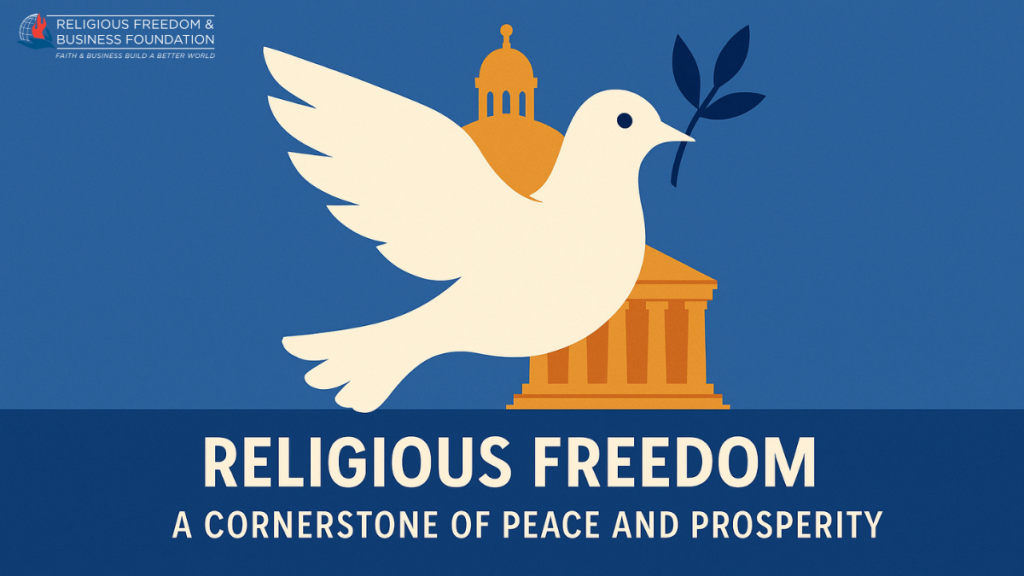
By Brian Grim
A Safeguard Against Misuse
Religious freedom for all (including for those without a religion) is a foundational pillar of thriving societies. It allows individuals to live according to their deepest convictions while contributing to the common good. When protected, it fosters pluralism, encourages ethical leadership, and helps prevent the misuse of religion for political or ideological gain.
Throughout history, nations that have upheld religious freedom have often experienced greater peace and prosperity. Consider these global examples:
- – The United States, founded on principles of religious liberty, became a magnet for immigrants seeking refuge from persecution. This diversity of faith traditions enriched American civic life and fueled innovation, entrepreneurship, and social reform. Religious freedom helped ensure that no single group could dominate the moral discourse, allowing for a vibrant marketplace of ideas.
- – Post-war Germany rebuilt its democratic institutions with strong protections for religious freedom, learning from the catastrophic consequences of religious and ethnic persecution under the Nazi regime. These protections have helped foster reconciliation, social cohesion, and a robust civil society.
- – India, despite its challenges, has long been home to a tapestry of religions. Its constitutional commitment to religious freedom has enabled interfaith dialogue and coexistence, even amid tensions. Where upheld, this freedom has supported democratic resilience and economic dynamism.
- – The Netherlands in the 17th century became a haven for religious refugees, including Jews, Huguenots, and dissenting Christians. This openness not only reduced sectarian conflict but also helped the Dutch Republic become a center of commerce, science, and intellectual exchange during its Golden Age.
- – South Korea, after decades of authoritarian rule, embraced democratic reforms in the late 20th century that included protections for religious freedom. Today, it is home to vibrant religious communities—Christian, Buddhist, and others—that contribute to civil society, education, and humanitarian work. Religious freedom has helped fuel South Korea’s rapid economic development and social innovation.
- – Botswana, one of Africa’s most stable democracies, has long upheld religious freedom as part of its inclusive governance model. This respect for diversity has contributed to peaceful coexistence among faith groups and supported the country’s steady economic growth and democratic resilience.
- – Singapore, despite its strict regulatory environment, has made religious harmony a national priority. Through interfaith councils and legal protections, it has cultivated a society where multiple religions coexist peacefully. This stability has been key to Singapore’s emergence as a global financial and cultural hub.
- – Brazil, with its constitutional guarantee of religious freedom, has seen faith-based organizations play a major role in addressing poverty, education, and healthcare. The country’s religious diversity—Catholic, Evangelical, Afro-Brazilian, and others—has enriched its cultural life and supported grassroots development.
By contrast, where religious freedom is denied, societies often suffer. Myanmar’s persecution of the Rohingya, China’s repression of Uyghur Muslims, and Iran’s restrictions on religious minorities illustrate how the suppression of religious liberty leads to human rights abuses, social unrest, and international condemnation.
Religious freedom also acts as a check against the hijacking of religion. In pluralistic societies, no single group can monopolize spiritual authority or use it to marginalize others. Open dialogue and accountability help preserve the integrity of religious traditions and prevent their exploitation for political gain.
In today’s world—marked by war, political instability, and technological upheaval—religious freedom is more vital than ever. It ensures that multiple moral voices can speak into complex issues, offering wisdom, compassion, and ethical guidance. It promotes peace by fostering mutual respect, and it drives prosperity by unlocking the full potential of every individual, regardless of belief.
Ultimately, religious freedom is not just a human right—it is a strategic asset for building inclusive, resilient, and flourishing societies.
